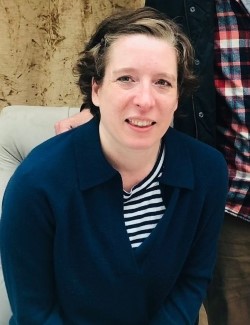 Congratulations to Elizabeth Parish, who defended her doctoral dissertation on April 15th! Her topic was "A New Neo-Aristotelian Theory of Matter and Form," and her director was Professor Michael Gorman, of the School of Philosophy at The Catholic University of America.
Congratulations to Elizabeth Parish, who defended her doctoral dissertation on April 15th! Her topic was "A New Neo-Aristotelian Theory of Matter and Form," and her director was Professor Michael Gorman, of the School of Philosophy at The Catholic University of America.
Elisabeth Parish was born and raised in Annapolis, MD. She received a bachelor’s degree in Applied Linguistics from University of Maryland, Baltimore County, a Master's in Liberal Arts from St. John’s College Annapolis, and a Master's in Philosophy from the School of Philosophy at the Catholic University of America. After living in South Korea and the UK for the past six years with her husband and son, she is now returning to the Baltimore-Washington area.
Dissertation Abstract:
Neo-Aristotelian metaphysicians use some version of Aristotle’s form to correct 20th century mathematical metaphysics, which cannot account for the unity of wholes. While these accounts have various problems with their formal principle, what they have in common is a material principle which is fundamentally particulate. I argue that it is this view of which matter gives rise to the problematic formal principles and thus causes the failure to produce unified individuals.
Although many neo-Aristotelians are not strict followers of Aristotle, I argue that using his conception of form requires using something like his conception of matter. At the lower levels Aristotle understands matter as more like stuff than individual parts. The sort of substantial form that corresponds to stuff matter is different than what neo-Aristotelians understand it to be. It can fully unify a whole without denying the actuality of matter in the whole.
The lowest levels of matter, according to current scientific theories, are not necessarily discrete individuals. I argue therefore that we should adopt a metaphysics of stuff matter—matter that lacks individual unity. Its form is an incomplete form which grants essential properties and allows matter to be incorporated into living things without losing these properties. Our contemporary theories do not allow us to make the judgment as to whether there is also particulate matter. Stuff matter may be basic matter or it may emerge from a particulate base.
By introducing an incomplete form into the metaphysics of things, it remains to consider how it is related to accidental and substantial forms. I argue that forms should be considered on a spectrum in two different ways. The first is ‘externally’. By placing incomplete forms between accidental and substantial forms we have a spectrum of weakest to strongest unifiers. The second is ‘internally’, by identifying the things that fall into each of the three categories of form and their placement relevant to each other. One result of this account of forms on a spectrum is that eliminativist ontologies are unnecessary in order to give a coherent account of all things that are.
